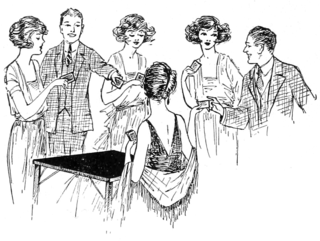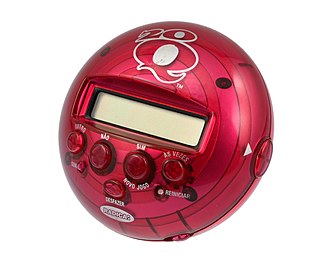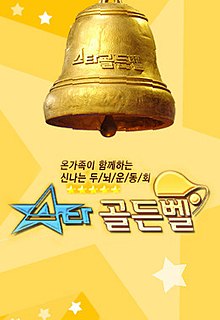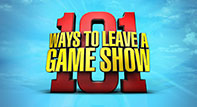Related Research Articles
Balderdash is a board game variant of a classic parlor game known as Fictionary or "The Dictionary Game". It was created by Laura Robinson and Paul Toyne of Toronto, Ontario, Canada. The game was first released in 1984 under Canada Games. It was later picked up by a U.S company, The Games Gang, and eventually became the property of Hasbro and finally Mattel. The game has sold over 15 million copies worldwide to date. It is aimed at fans of word games, such as Scrabble.

Party games are games that are played at social gatherings to facilitate interaction and provide entertainment and recreation. Categories include (explicit) icebreaker, parlour (indoor), picnic (outdoor), and large group games. Other types include pairing off (partnered) games, and parlour races. Different games will generate different atmospheres so the party game may merely be intended as an icebreakers, or the sole purpose for or structure of the party. As such, party games aim to include players of various skill levels and player-elimination is rare. Party games are intended to be played socially, and are designed to be easy for new players to learn.

Mastermind or Master Mind is a code-breaking game for two players. The modern game with pegs was invented in 1970 by Mordecai Meirowitz, an Israeli postmaster and telecommunications expert. It resembles an earlier pencil and paper game called Bulls and Cows that may date back a century.

A parlour or parlor game is a group game played indoors. They were often played in a parlour. These games were extremely popular among the upper and middle classes in Great Britain and in the United States during the Victorian era.
Syntax guessing, also known as guess-the-verb, guess-the-noun and the syntax quest, is a problem sometimes encountered in text-based video games, such as interactive fiction games and multi-user dungeon (MUD) games. For various reasons - including a limited vocabulary, or a simple VERB-NOUN parser - the command syntax necessary to carry out an action may be obscure, such as with a button where the player must type PRESS BUTTON, while PUSH BUTTON does not work, an item described as a pillow that can only be obtained by typing GET CUSHION rather than GET PILLOW, or a situation where the command TURN THE DIAL works but TURN DIAL does not. If syntax guessing is necessary at a critical step, the game may appear unwinnable, with the player stuck until the right phrasing is guessed or is supplied by a walkthrough. A quest that requires syntax guessing to complete is a "syntax quest", especially if it consists of little to no content other than syntax guessing.

Bunco is a parlour game generally played with twelve or more players, divided into groups of four, trying to score points while taking turns rolling three dice in a series of six rounds. A Bunco is achieved when a person rolls three-of-a-kind and all three numbers match the round number.

20Q is a computerized game of twenty questions that began as a test in artificial intelligence (AI). It was invented by Robin Burgener in 1988. The game was made handheld by Radica in 2003, but was discontinued in 2011 because Techno Source took the license for 20Q handheld devices.

Flamingo Fortune is an American game show for the Florida Lottery that aired from 1995–1999. It was originally produced by Mark Goodson Productions, at the time also producing game shows for state lotteries alongside his regular game shows. After the first five shows, production was transferred to Jonathan Goodson Productions, after All American Television spun out their lottery game shows to Mark Goodson's son, Jonathan Goodson. Production would later transfer to Columbia TriStar Television and Game Show Network from 1997 to 1999. The program was taped at Universal Studios Florida near Orlando, Florida.

Purble Place was a suite of three computer games. Developed by Oberon Media for Microsoft, it was introduced in Windows Vista and is also included in Windows 7. It was no longer available starting with Windows 8.

Star Golden Bell (Korean: 스타골든벨) was a South Korean variety show broadcast on KBS. A popular show, it occasionally entered the Korean top 20 chart. The show consisted of mini-games, which have certain prize amounts. The winning celebrity is given the opportunity to ring the bell by correctly answering a riddle. If he or she is correct, the money is donated in the winner's name. All "winnings" go to a charity of KBS's choice; the last donation, in the amount of $110,000, was made on July 1, 2008. In addition to the main MC, Jun Hyun-moo (전현무), there were two additional hosts, Kim Je-dong (김제동) and Lee Chae-young (이채영), who were either in charge of administering games or were challengers competing against the celebrity contestants. Star featured 5 lines of 4 people each which had various celebrities from music, film, television, and musicals. The last line ("Bell") contains regularly appearing celebrities.
It's Not What You Know is a game show hosted by Chris Tarrant, which aired on the British digital TV channel Challenge from 28 April to 6 June 2008.

It's Anybody's Guess is an American game show broadcast on NBC from June 13 to September 30, 1977. Monty Hall hosted the show while Jay Stewart was the announcer. Produced by Stefan Hatos-Monty Hall Productions, it was Hall's first time hosting a show other than Let's Make a Deal since 1962, when he hosted Video Village.

Beagle Bag is a collection of video games for the Apple II family of computers published in 1982 by Beagle Bros Software. In common with their other titles, the Beagle Bag software was released in unlocked and unprotected form, and is now in the public domain.

101 Ways to Leave a Game Show is an American game show hosted by Jeff Sutphen. The series premiered on June 21, 2011, on ABC and ran for six episodes.
Bad Piggies is a puzzle video game developed by Rovio Entertainment, and was the company's first spin-off of Angry Birds. The game launched on Android, iOS, Windows, and Mac on September 27, 2012. It was released for BlackBerry 10 in October 2013 and for Windows Phone in April 2014. Unlike the Angry Birds games, the player assists the minion pigs in building contraptions that travel on land and in air to collect pieces of a map to ultimately capture and take away the Angry Birds eggs. As of October 2012, Bad Piggies was the fastest-selling game on the Apple App Store, and the quickest one to reach the top of the app list in just three hours.
Time's Up is a charades-based party game designed by Peter Sarrett, and published by R&R Games, Inc., a Tampa, FL based manufacturer of tabletop games and party games. The first edition of the game was published in 1999, with the most recent edition, Times' Up! Deluxe, published in 2008. It is a game for teams of two or more players, and is played in three rounds. Time's Up! is based on the classic parlour game known as Celebrity.

Ellen's Game of Games, also known as Game of Games and stylized as ellen's GAME OF GAMES, is an American television game show that aired on NBC. In March 2017, NBC ordered six hour-long episodes of the series. Ellen DeGeneres serves as host, while Stephen "tWitch" Boss appears as announcer/sidekick. The series is based on game segments from DeGeneres' daytime talk show, The Ellen DeGeneres Show. A special preview episode aired on December 18, 2017, with the official series premiere on January 2, 2018. On January 9, 2018, NBC renewed the series for a 13-episode second season. On January 16, 2019, NBC renewed the series for a third season. The third season premiered on January 7, 2020. On February 18, 2020, DeGeneres announced on The Ellen DeGeneres Show that the series was renewed for a fourth season. The fourth season premiered on October 6, 2020.

Game of Games is an Australian TV game show hosted by Grant Denyer based on the American game show Ellen's Game of Games. It premiered on Network Ten on Sunday, 7 October 2018 at 7:30pm and on 24 November 2018 Channel Ten changed its timeslot to 7:00pm every Saturday. The first season concluded on 15 December 2018.
References
- Anderson, Leigh. The Games Bible, Workman Publishing Company (2010) ISBN 978-0-7611-5389-4
- Jones, Myfanwy. Parlour Games for Modern Families, Penguin Group (2010) ISBN 978-1-84614-347-2